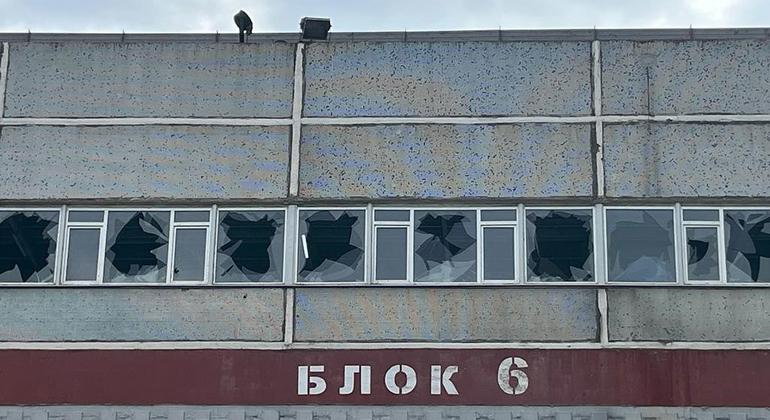Director General Rafael Mariano Grossi was speaking on Thursday after he and IAEA experts visited Europe’s largest nuclear plant, which has seen repeated shelling in recent weeks, sparking fears of a catastrophe.
“It’s obvious that the plant, and the physical integrity of the plant has been violated, several times. [Whether] by chance [or deliberately], we don’t have the elements to assess that. But this is a reality that we have to recognize, and this is something that cannot continue to happen,” he told journalists.
“Wherever you stay, wherever you stand, whatever you think about this war, this is something that cannot happen, and this is why we’re trying to put in place certain mechanisms and the presence of our people there, to try to be in a better place.”
The Zaporizhzhia plant houses six of the 15 nuclear reactors in Ukraine.
It has been occupied by Russian forces since the early weeks of the war in Ukraine, now in its seventh month.
Both sides have accused the other of shelling the plant.
Maintaining a presence
An IAEA expert mission finally arrived there on Thursday, following months of diplomatic negotiations.
In a video posted on his official Twitter account that day, Mr. Grossi reported that the experts had completed an initial tour of the plant, though there is still more to do.
“My team is staying on,” he said, adding “most importantly, we are establishing a continued presence from the IAEA here.”

© IAEA
IAEA Director-General Rafael Mariano Grossi (second left) and the IAEA expert mission team arrive at the Zaporizhzhya Nuclear Power Plant in Ukraine.
The 14-member mission deployed from Vienna on Monday in efforts towards ensuring nuclear safety and security at the plant, undertaking vital safeguard activities, and assessing the working conditions of the Ukrainian staff there.
Renewed shelling last week hit the area of the plant’s two so-called special buildings, located about 100 metres from the reactor buildings, as well as an overpass area.
WHO donates ambulances to Ukraine
Meanwhile, the World Health Organization (WHO) has delivered 11 first aid ambulances to Ukraine amid ongoing attacks against healthcare in the country, the UN agency reported on Friday.
The vehicles will be handed over to the Lviv Emergency Medical Service Department then distributed throughout Ukraine.
The donations were made possible through support from the UN Central Emergency Response Fund (CERF), which ensures that urgently needed humanitarian assistance reaches people caught up in crises.
Timely transport saves lives
“These ambulances will save lives and go a step further in ensuring that timely access to emergency care during the war is strengthened and maintained,” said Dr. Jarno Habicht, WHO Representative in Ukraine.
He was speaking at a handover ceremony alongside Ukraine’s Health Minister, Dr. Viktor Liashko, who emphasized that international support is a powerful tool in sustaining the country’s medical system during wartime.
“Emergency healthcare workers are the first ones to arrive at the scene of an accident and do everything they can to save people’s lives,” he said.
“Thanks to modern ambulances, healthcare workers not only provide timely transport for people who are injured or in critical condition from the accident scene to a medical facility, but also stabilize their condition during transport.”
WHO and partners have donated more than 30 ambulances to Ukraine’s Ministry of Health since the war began on 24 February, with more deliveries expected later in the year.
The agency has also delivered more than 1,300 metric tonnes of life-saving medical supplies to the country, including power generators, oxygen supplies for medical facilities, and medicines to help treat noncommunicable diseases.

